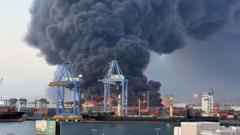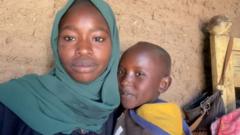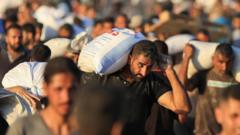Port Sudan faces a complete power outage after drone strikes targeted critical infrastructure for the third consecutive day amid escalating violence from paramilitary forces. The attacks have prompted the UN to temporarily suspend aid flights as the situation worsens for the civilian population.
Port Sudan Plunged into Darkness Following Drone Strikes Amid Intensifying Conflict

Port Sudan Plunged into Darkness Following Drone Strikes Amid Intensifying Conflict
A severe power outage has hit Port Sudan as drone attacks from paramilitary forces wreak havoc, disrupting essential services and causing widespread fear.
The city of Port Sudan has been left without power following a series of drone strikes that hit a major power station, as confirmed by the country’s electricity provider. The attacks mark the third day of paramilitary aggression, leading to explosions and massive fires near the city’s main international airport. As a result, multiple flights have been canceled due to the situation chaos.
Eyewitness Cristina Karrer described the atmosphere as "apocalyptic," with thick black smoke enveloping the once safe city, which has hosted many fleeing the ongoing two-year civil war. Sudan's electricity company is currently evaluating the damage to its substation, which has severely hindered the supply of water, health services, and other critical needs.
Reports indicate that one of the drones targeted Port Sudan's civilian airport while others struck nearby military facilities and even a fuel depot in the densely populated city center. Notably, a significant hotel located adjacent to army chief Gen Abdel Fattah al-Burhan’s residence also suffered damage in the attacks.
In response to the escalating violence, the UN has paused aid flights to the region while maintaining other operations, affirming that their offices remain untouched. Government spokespeople have expressed their commitment to secure the affected fuel depots and emphasized the resilience of the Sudanese people amidst the conflict.
The African Union has condemned the attacks as a “dangerous escalation” that not only endangers civilians but also threatens humanitarian access in an already dire situation. Prior to these attacks, Port Sudan had managed to evade bombardment and was regarded as one of the last safe havens in a nation battered by civil strife.
The paramilitary group, known as the Rapid Support Forces (RSF), has shifted tactics by employing drones to regain control over lost territories, including battles for the capital Khartoum. Over the course of the last two years, fighting between the RSF and the national army has resulted in thousands of deaths, displacing millions, and precipitating an unprecedented humanitarian crisis. Both factions have faced allegations of war crimes, heightening international concern over the situation.
Eyewitness Cristina Karrer described the atmosphere as "apocalyptic," with thick black smoke enveloping the once safe city, which has hosted many fleeing the ongoing two-year civil war. Sudan's electricity company is currently evaluating the damage to its substation, which has severely hindered the supply of water, health services, and other critical needs.
Reports indicate that one of the drones targeted Port Sudan's civilian airport while others struck nearby military facilities and even a fuel depot in the densely populated city center. Notably, a significant hotel located adjacent to army chief Gen Abdel Fattah al-Burhan’s residence also suffered damage in the attacks.
In response to the escalating violence, the UN has paused aid flights to the region while maintaining other operations, affirming that their offices remain untouched. Government spokespeople have expressed their commitment to secure the affected fuel depots and emphasized the resilience of the Sudanese people amidst the conflict.
The African Union has condemned the attacks as a “dangerous escalation” that not only endangers civilians but also threatens humanitarian access in an already dire situation. Prior to these attacks, Port Sudan had managed to evade bombardment and was regarded as one of the last safe havens in a nation battered by civil strife.
The paramilitary group, known as the Rapid Support Forces (RSF), has shifted tactics by employing drones to regain control over lost territories, including battles for the capital Khartoum. Over the course of the last two years, fighting between the RSF and the national army has resulted in thousands of deaths, displacing millions, and precipitating an unprecedented humanitarian crisis. Both factions have faced allegations of war crimes, heightening international concern over the situation.



















